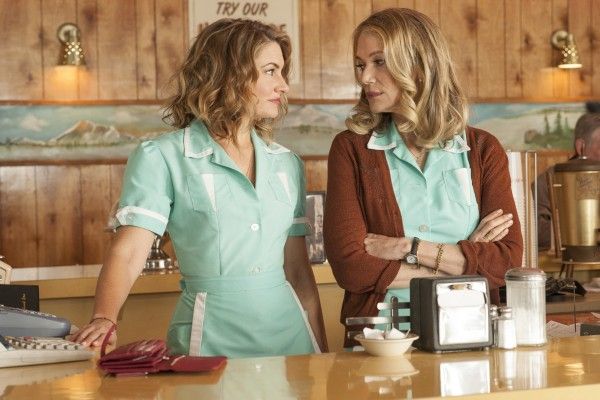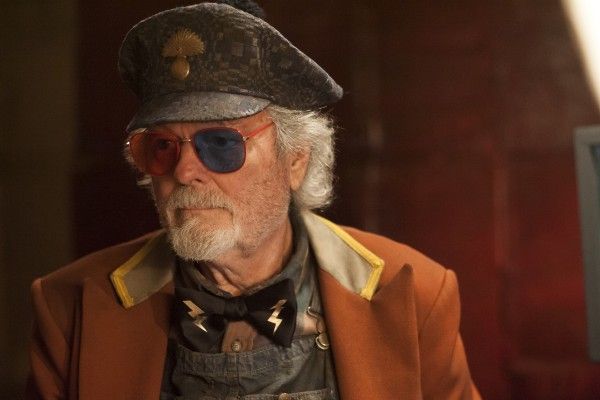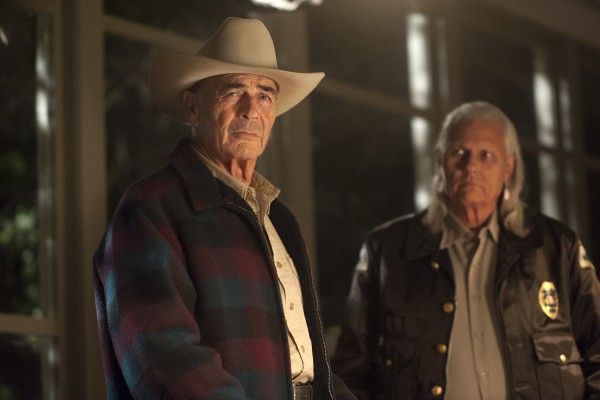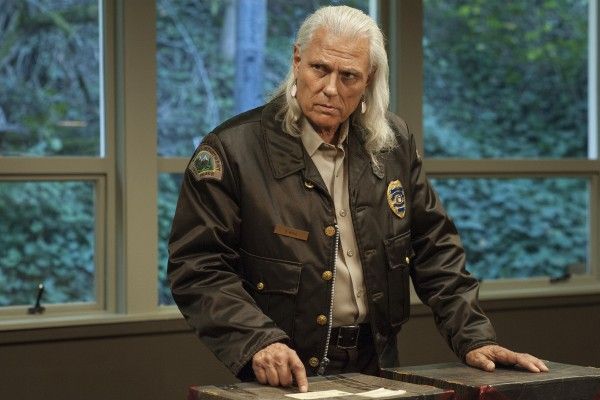It's hard to get ahold of anything in the moment when it comes to David Lynch, at least at first blush. About an hour into my first viewing of Inland Empire, I was quite literally checking where the exits were in Alice Tully Hall in the hopes that a brief leave from Lynch's miasma would give me better bearings. And attempting to hone in on what Lynch has been circling in these latest episodes of Twin Peaks hasn't exactly been a cakewalk, though there was finally some sense of the scope of Lynch's latest vision that came into relief in tonight's episode.
After a lot of set-up in the first four episodes, aided by Lynch's enchanting and terrifying stylistic flourishes, the fifth episode started digging into the world that Lynch is building, fleshing out the vaguely enigmatic exchanges and bewildering actions that have gone on so far. The sequence at the casino with Brett Gellman's supervisor was a good example of this with the introduction of the violent Mitchum brothers, played by James Belushi and Robert Knepper, who run the casino and are none too pleased about Dougie's streak. And then there was the initially bewildering storyline involving Caleb Landry Jones' Steve getting chewed out about a bad cover letter that later blossomed in the cocaine scene with his wife (Amanda Seyfried). The close-up long take on Seyfried as she blisses out on coke is one of the most wondrous moments in the season thus far. It also immediately made me think of Laura Palmer's ecstatic smile and Laura Dern's fearless close-ups in Inland Empire.
In the case of both Jones and Gellman's characters, the focus was on how one acts at work. For Jones' character, there was a lack of seriousness, decorum, and respect in his demeanor; in the case of Gellman's supervisor, his lack of influence on a situation seemed to imply not only influence but complicity in crime. This was also the case with the bifurcated Dale Cooper who now aimlessly walks around the offices of his insurance overlords, accidentally confronting buried memories of the FBI agent he once was so long ago. If Kyle MacLachlan's doings as Dougie were humorous in parts 3 and 4, his inability to remember felt more melancholic and disastrous in part 5. Watching him stare at the grand metallic statue of a lawman with just the faintest hint of desire and recollection of his old life in his eyes is tragic, as is the moment when he latches onto his boss using the word "agent." He's also, of course, a comical buffoon, awkwardly standing in the way of coworkers and stealing coffee from colleagues. And in teasing Dougie's illicit relationship with Tom Sizemore's insurance hotshot, Lynch gives a bit more shade to the strange criminal enterprise Dougie was embroiled in before Cooper returned from the other side.
There were plenty of moments that continued to build-up the more out-there elements of the narrative, specifically the whole Argentina box situation but also the nightmarish nonsense invoked in interrogation by the other Cooper, who seems to still be attached to Frank Silva's nefarious Bob. More meaningful were the asides like the tip-toeing boy who nearly triggers a car bomb while his mom is passed out on dope, a storyline that dangles precariously between the absurd and the mortifying much like Lynch's program on the whole. One could also glean this from Sheriff Frank Truman's run-in with his wife, Doris (Candy Clark), who delivers an emotional tirade about plumbing issues, one filled with oversized pronouncements and outbursts. And at the end of it, she says something to the effect that it's the stoic Truman who is impossible rather than her. From Lynch's perspective, you can almost see how she's right in thinking mad, wild tantrums about everyday duties are more sane than just quietly working away at things.
The last scene worth noting is a short one that occurs between Hawk and Andy at a table, in which the latter big-hearted dimwit simply says that he can't find any Indians in the files about Palmer's murder and Cooper's disappearance. It's a perfect encapsulation of the relationship between the characters but its also a giddy bit of self-awareness in suggesting that everyone may be looking for the wrong thing with the new series, especially in wanting to see more of the original Twin Peaks cast and their life. Cooper being stuck in Dougie's life also hints at an inability (or a straight-up refusal) to simply remember and repeat what one did before. Dr. Jacoby has gone from being a well-respected doctor to a gold-shovel hocking Alex Jones type, and Wendy Robie's Nadine is a big fan of his anti-government diatribes. For Jerry, it's just something funny to watch while high. In these moments, and the all-too-brief return of Mädchen Amich's Shelly and Peggy Lipton's Norma, one can see Lynch looking back at himself and not being able to simply replicate what he made in the 1990s. Lynch can't and won't return to the same subject matter in the same way, and you can feel both the liberation and the displacement that this decision yields in the drama he's creating here. His departure from the familiar may not only be the boldest element of Twin Peaks' latest season. It may very well prove to be the series' saving grace.
Rating:★★★★★






